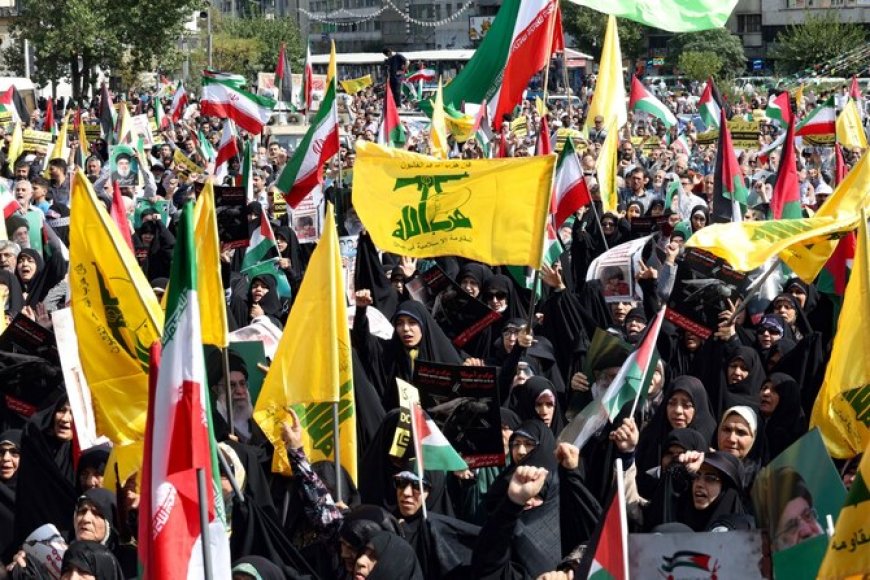Hezbollah: The Complex Power Broker in Lebanon and Beyond
The recent confirmation of Hezbollah's leader, Hassan Nasrallah's, death marks a pivotal moment in the ongoing conflict between the group and Israel. This blow follows months of escalating tension, which has left Lebanon and the wider region at a crossroads. Hezbollah, a potent force politically and militarily, has long been a central figure in the region’s volatile dynamics, but recent developments signal a potential shift in its regional influence and Lebanon's future.

The latest validation of Hezbollah's leader, Hassan Nasrallah's, death signals a turning point in the continuous struggle between the organization and Israel. Months of rising conflict have preceded this strike, leaving Lebanon and the surrounding area at a crossroads. Strong militarily and politically, Hezbollah has long been a major player in the unpredictable dynamics of the area; nevertheless, recent events suggest a possible change in its regional impact and Lebanon's destiny.
Formed during the Lebanese Civil War in the early 1980s in direct response to Israel's invasion and occupation of southern Lebanon, Hezbollah, translated as the "Party of God" in Arabic, Originally established with major support from Iran's Islamic Revolutionary Guard Corps (IRGC), the organization rapidly established itself as a resistance movement opposing Israeli soldiers. Its military victories in forcing Israeli forces out of Lebanon in 2000 confirmed its local and regional clout. Deeply ingrained in Lebanese society, Hezbollah's military and political branches position themselves as both a national resistance organization and a supplier of vital social services in a broken state.
Deep links to Iran have molded the group's philosophy and activities, thereby bringing it into line with the larger Axis of Resistance—a coalition of terrorist organizations supported by Iran across the Middle East including Yemen's Houthi rebels, Hamas, and Iraq's Shiite militias. These factions taken together oppose Israel and Western dominance, therefore aggravating the already tense geopolitical scene of the area.
Increasing Tensions and Military Confrontations
Following a string of deliberate Israeli strikes that have killed several high-ranking Hezbollah commanders in recent months, including Fuad Shukr, a top advisor to Nasrallah, and Ibrahim Aqil, Commander of Hezbollah's special Radwan Force, Nasrallah dies. Targeting Hezbollah strongholds in southern Beirut and the Bekaa Valley especially, Israel's deliberate attacks respond to the group's involvement in intensifying cross-border conflict.
The larger Israel-Hamas war, started by Hamas's October 7 attack on Israel, provides the immediate context for these latest confrontations. From Lebanon, Hezbollah has started a sequence of cross-border missile strikes aimed at diverting Israeli military resources and proving its ongoing backing of Palestinian terrorists. Rising tensions resulted in a spike in bloodshed; Israeli air strikes this week allegedly killed over 550 people in Lebanon, the worst escalation since the country's civil war.
Hezbollah's Increasing Regional Influence
Beyond its influence in internal affairs of Lebanon and disputes with Israel, Hezbollah is fundamental in regional power dynamics. One of Iran's most devoted and competent proxies, Hezbollah has been essential in arming and training Shiite militias in Iraq, supporting Houthi rebels in Yemen, and giving Syrian President Bashar al-Assad vital military backing throughout his nation's civil war. Along with increasing its influence, Hezbollah's involvement in the Syrian crisis underlined the group's significance in Iran's more general regional policy.
Hezbollah's advanced military might—which includes a large fleet of guided missiles and a vast network of subterranean tunnels—has helped it to become among the most powerful non-governmental entities in the area. Though experts estimate the number to be closer to 50,000, a force yet sufficient to threaten national forces, the organization claims to have command over 100,000 men.
Political power and domestic influence of Hezbollah
Hezbollah is quite powerful militarily and politically in Lebanon. Under the pretext of opposition to Israel, they is the only Lebanese side who kept their weapons after the end of the civil war in their country. Critics of Hezbollah have accused the group of functioning as a "state within a state," underlining control of sections of southern Lebanon, the Bekaa Valley, and Beirut's southern suburbs. Further ingressing itself into the life of many Lebanese Shiites, it now manages a large social services network including hospitals, schools, and emergency response agencies.
Hezbollah's military might although it has not been without difficulties. Since 2022, Lebanon has been caught in political gridlock with allies of Hezbollah unable to choose a new president. Amid one of the greatest economic crises the nation has ever experienced, this deadlock has left the nation without a formal leader, thereby aggravating tensions among the people.
Global Reaction and Names for Designation
Although supporters of Hezbollah see it as a legitimate resistance movement, some nations, notably the United States and European Union members, have labeled its armed component as a terrorist group. Hezbollah's participation in several attacks—including the 1983 bombings of the U.S. embassy and Marine barracks in Beirut and the 2005 murder of former Lebanese Prime Minister Rafic Hariri—helps to define this designation. Further underlining the group's dubious global reputation, in 2022 a UN-backed court condemned two Hezbollah members to life in absentia for their involvement in the Hariri killing.
The Way Forward
The death of Nasrallah begs important issues regarding the direction of Hezbollah and its involvement in Lebanon and the surrounding areas. Along with the previous losses of important commanders, his death seriously compromises Hezbollah's leadership structure and may temporarily weaken the group's hold on power. Nonetheless, Hezbollah's strong relationship with Iran, its well-established military capability, and its very ingrained influence point to the group's continued major presence in the geopolitical scene of the Middle East.
Lebanon's precarious political and financial position just becomes worse as Israel and Hezbollah go on their cycle of revenge. There is great chance of more general regional escalation, which would deepen differences all throughout the Middle East. Whether Hezbollah can withstand this unparalleled blow and keep its rank among the most potent and divisive players in the area will depend critically on the next weeks.













































